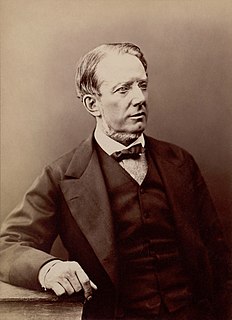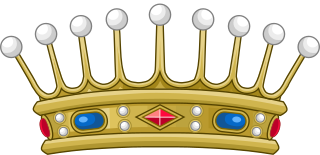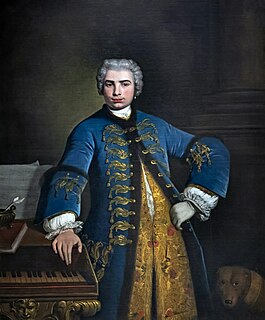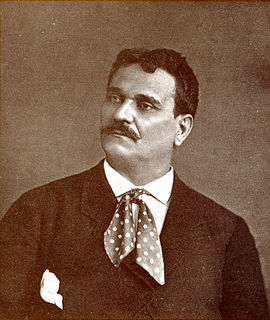
Michael William Balfe was an Irish composer, best remembered for his operas, especially The Bohemian Girl.

During the Middle Ages, the counts of Blois were among the most powerful vassals of the King of France.
Charles Hart is an English lyricist, librettist and songwriter best known for his work on The Phantom of the Opera as well as a number of other musicals and operas for both stage and television.

James Kenney, an English dramatist, was the son of James Kenney, a founder of Boodles' Club in London. He produced more than 40 plays and opera libretti.
Charles Lamb Kenney was a journalist, dramatist and miscellaneous writer.

The Bohemian Girl is an Irish Romantic opera composed by Michael William Balfe with a libretto by Alfred Bunn. The plot is loosely based on a Miguel de Cervantes' tale, La Gitanilla.

La Grande-Duchesse de Gérolstein is an opéra bouffe, in three acts and four tableaux by Jacques Offenbach to an original French libretto by Henri Meilhac and Ludovic Halévy. The story is a satirical critique of unthinking militarism and concerns a spoiled and tyrannical young Grand Duchess who learns that she cannot always get her way.

The Sapphire Necklace, or the False Heiress, was the first opera composed by Arthur Sullivan. It was never performed, and most of the music and libretto are now lost.

Edmund Falconer, born Edmund O'Rourke, was an Irish poet, actor, theatre manager, songwriter and playwright, known for his keen wit and outstanding acting skills.

The Théâtre Lyrique was one of four opera companies performing in Paris during the middle of the 19th century. The company was founded in 1847 as the Opéra-National by the French composer Adolphe Adam and renamed Théâtre Lyrique in 1852. It used four different theatres in succession, the Cirque Olympique, the Théâtre Historique, the Salle du Théâtre-Lyrique, and the Salle de l'Athénée, until it ceased operations in 1872.
William Michael Rooke was an Irish violinist and composer.

Amilie, or the Love Test is an opera in three acts by the Irish composer, William Michael Rooke, to a libretto by John Thomas Haines.

Farinelli is an opera in two acts, described as 'serio-comic', by John Barnett, to a libretto by his brother Charles Zachary Barnett. Produced in 1839, it is the third of the composer's large-scale operas, and was the last to reach the stage. The hero is the castrato singer Farinelli, although the storyline of the opera is fictional.

Henri Charles Antoine Gaston Serpette was a French composer, best known for his operettas. After winning the prestigious Prix de Rome as a student at the Paris Conservatoire, he was expected to pursue a career in serious music. Instead, he turned to operetta, writing more than twenty full-length pieces between 1874 and 1900. He accepted some conducting work and also served as a critic and journalist for a number of French newspapers and magazines.

The Rose of Castille is an opera in three acts, with music by Michael William Balfe to an English-language libretto by Augustus Glossop Harris and Edmund Falconer, after the libretto by Adolphe d'Ennery and Clairville for Adolphe Adam's Le muletier de Tolède (1854). It was premiered on 29 October 1857, at the Lyceum Theatre, London.

Les bavards is an opéra bouffe, or operetta, by Jacques Offenbach, with a French libretto by Charles-Louis-Étienne Nuitter based on "Los dos habladores", a story by Miguel de Cervantes.

Jean-Vital Jammes was a French opera singer. During a stage career spanning 40 years, he created many leading baritone roles, including Zurga in Bizet's Les pêcheurs de perles and Ourrias in Gounod's Mireille. Born in Le Passage d'Agen near the town of Agen, he was largely self-taught and made his stage debut in 1841 at the age of 16. After singing in several provincial theatres, he was engaged by the Théâtre Lyrique in Paris and later by the Opéra-Comique. Following his retirement from the stage, Ismaël lived in Marseille where he died at the age of 68.

Der Waffenschmied is an opera (Singspiel) in three acts by Albert Lortzing. The German-language libretto was by the composer after Friedrich Wilheim von Ziegler's Liebhaber und Nebenbuhler in einer Person. This is often considered his third most popular work. His works are considered to be part of the Biedermeier period. It premiered in Vienna at the Theater an der Wien on 31 May 1846 conducted by Lortzing. The role of Marie was written with Jenny Lind in mind who he hoped would sing the part. The opera was eventually successful enough that Lortzing was offered the post of Kapellmeister at the theatre which he held until the revolution of 1848, when he had to return to Leipzig. Arnold Schönberg, arranged Lortzing's "Waffenschmied“ for piano for 4 hands. The story is set in the city of Worms in the 16th century.
Marie Tudor is an 1833 play by the French writer Victor Hugo. It is a historical work portraying the rise, fall and execution of Fabiano Fabiani, a fictional favourite of Mary I of England (1516-1558). Mary has Fabiani thrown in the Tower of London and despite later wishing to spare his life, is unable to do so. This was an influence on Oscar Wilde's later The Duchess of Padua.













